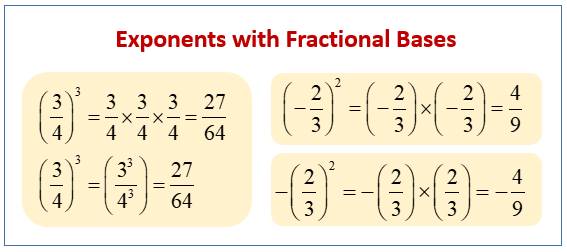Exponents with Fractional Bases
Related Topics:
More Lessons for Grade 6 Math
Math Worksheets
Examples, solutions, videos, and worksheets to help Grade 6 students learn how to evaluate exponents with fractional bases or fractions raised to a power.
How to evaluate exponents with fractional bases?
Exponents with fractional bases follow the same fundamental rules of exponents as those with integer bases. The exponent indicates how many times the fractional base is multiplied by itself. The key is to remember that the exponent applies to both the numerator and the denominator of the fraction.
The following diagram shows some examples of how to evaluate exponents with fractional bases. Scroll down the page for more examples and solutions of fractions raised to a power.

Exponent Worksheets
Practice your skills with the following exponent worksheets:
Printable & Online Exponent Worksheets
Lessons on Exponents
Exponents with Different Types of Bases
For a fractional base \(\frac{a}{b}\) raised to an exponent n:
\((\frac{a}{b})^n = \frac{a^n}{b^n}\)
This means you can raise the numerator to the power of n and the denominator to the power of n separately.
Example: Evaluate \((\frac{2}{3})^3\)
\((\frac{2}{3})^3 = \frac{2^3}{3^3} = \frac{8}{27}\)
Fractions Raised to a Powers
This video provides two examples of evaluating a positive fraction raised to a power.
Negative Fractions Raised to Powers
This video provides examples of raising negative fractions to powers.
Try out our new and fun Fraction Concoction Game.
Add and subtract fractions to make exciting fraction concoctions following a recipe. There are four levels of difficulty: Easy, medium, hard and insane. Practice the basics of fraction addition and subtraction or challenge yourself with the insane level.

We welcome your feedback, comments and questions about this site or page. Please submit your feedback or enquiries via our Feedback page.